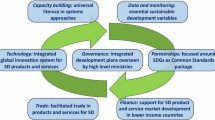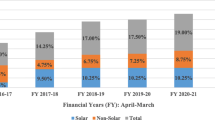Abstract
Despite an array of concerns on the part of its 28 member states, the North Atlantic Treaty Organization is gradually moving towards greater involvement in energy security issues. Real world events as well as the interests of some of NATO’s partner countries have been important drivers in this regard. The challenge for the alliance will be to develop a practical agenda in energy security which plays to NATO’s strengths, yet, without unduly militarising the issue nor duplicating efforts by other actors.
Similar content being viewed by others
Notes
See Jamie Shea, ‘Energy Security: NATO’s Potential Role’, NATO Review, Autumn 2006
and Thierry Legendre, ‘The North Atlantic Treaty Organization’s Future Role in Energy Security’, The Whitehead Journal of Diplomacy and International Relations, Summer/Fall 2007, 29–35.
‘The Parties will consult together whenever, in the opinion of any of them, the territorial integrity, political independence or security of any of the Parties is threatened’.
Riga Summit Declaration, NATO Press Release (2006) 150, 29 November 2006, Paragraph 45.
Bucharest Summit Declaration, NATO Press Release (2008) 049, 3 April 2008, Paragraph 48.
On the early phase of NATO’s role in energy security see Phillip Cornell, Regional and International Energy Security Dynamics: Consequences for NATO’s Search for an Energy Security Role, Geneva Paper No. 5 (Geneva Centre for Security Policy, 2012), 30–32.
See Michael Rühle, ‘NATO and Energy Security. Toward a more Coherent Approach’, Internationale Politik (Transatlantic Edition), May 2011.
See Johannes Varwick, ‘NATO’s Role in Energy Security’, Internationale Politik (Transatlantic Edition), April 2008.
John R. Deni, ‘Culture, Institutions, and Defense Cuts: Overcoming Challenges in Operational Energy Security’, Journal of Transatlantic Studies 10, no. 4 (2012): 396–410.
See Anders Fogh Rasmussen (NATO Secretary General), ‘NATO and Climate Change’, Huffington Post, December 15, 2009, https://doi.org/www.huffingtonpost.com/anders-fogh-rasmus-sen/nato-and-climate-change_b_392409.html (accessed June 28, 2012).
See Jamie Shea, Keeping NATO Relevant, Carnegie Policy Outlook, April 2012, 7–8.
Author information
Authors and Affiliations
Corresponding author
Additional information
Notes on contributor
Michael Rühle is currently Head of the Energy Security Section in the Emerging Security Challenges Division at NATO Headquarters in Brussels. Previously he was Head of Speechwriting in the NATO Secretary General’s Policy Planning Unit. Before joining NATO’s International Staff in 1991, Mr Rühle has been a Visiting Fellow at the Konrad-Adenauer-Stiftung, Sankt Augustin, Germany, and a Visiting Fellow at the Center for Strategic and International Studies (CSIS), Washington, DC. He holds an MA degree in Political Science from the University of Bonn. Mr Rühle has published widely on international security issues, notably on transatlantic relations and nuclear policy. His most recent publication is ‘NATO and Energy Security’ in Internationale Politik (Global Edition), May/June 2011.
Rights and permissions
About this article
Cite this article
Rühle, M. NATO and energy security: from philosophy to implementation. J Transatl Stud 10, 388–395 (2012). https://doi.org/10.1080/14794012.2012.734673
Published:
Issue Date:
DOI: https://doi.org/10.1080/14794012.2012.734673




